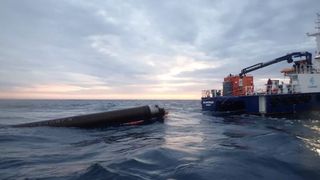Home
News
Spaceflight

Rocket Lab recovered the first stage of its Electron booster for the first time ever during the “Return to Sender” mission, which launched on Nov. 19, 2020.
(Image credit: Rocket Lab)
Rocket Lab’s next mission will feature a booster recovery at sea, if all goes according to plan.
The California-based company announced on Thursday (June 22) that it’s targeting July 14 for the next launch of its Electron rocket. That mission, called Baby Come Back, will send seven small satellites to orbit from Rocket Lab’s New Zealand site, on the North Island’s Mahia peninsula.
And that’s not all. As its name suggests, Baby Come Back will feature a recovery component: Rocket Lab plans to fish the 59-foot-tall (18 meters) Electron’s first stage out of the Pacific, then haul it back to land for inspection and analysis.
“Data from this recovered stage will inform Rocket Lab’s ongoing recovery and reuse program,” the company said in a statement on Thursday.
Related: Rocket Lab launches 1st Electron booster from US soil in twilight liftoff
The Electron’s first stage will come back to Earth under parachutes, making a soft splashdown in the sea. The rocket is too small to make powered touchdowns like those performed by SpaceX’s Falcon 9; the Electron cannot carry enough fuel to have the requisite amount left over for landing maneuvers.
(Rocket Lab originally aimed to pluck falling Electron first stages out of the sky with a helicopter, but the company has taken the chopper out of the mix.)
Rocket Lab has already performed one such recovery this year, during a March 24 mission that lofted two Earth-observation satellites for the Virginia-based company BlackSky.
Analysis of that booster, and a handful of previously recovered rockets, suggests that the currently expendable Electron can indeed be made partially reusable, Rocket Lab has said.
And the company plans to take a big step in that direction soon: It aims to launch an Electron with one pre-flown Rutherford engine on a mission later this year. (The Electron features nine Rutherfords in its first stage and one vacuum-optimized Rutherford in its upper stage.)
“Rocket Lab will assess the opportunities for flying a complete pre-flown first stage booster following the launch of the pre-flown Rutherford engine in the third quarter this year,” company representatives wrote in an update on April 19.
The seven satellites going up on Baby Come Back belong to three different customers. Four of them are cubesats for NASA’s Starling mission.
“Starling will demonstrate technologies for in-space network communications, onboard relative navigation between spacecraft, autonomous maneuver planning and execution and distributed science autonomy — an experiment for small spacecraft to autonomously react to observations, paving the way for future science missions,” Rocket Lab wrote in the June 22 statement.
The Electron will also launch the LEO 3 demonstration satellite for the Canadian communications company Telesat and two cubesats for Virginia-based Spire Global, which operates a constellation that observes Earth in radio frequencies.
Join our Space Forums to keep talking space on the latest missions, night sky and more! And if you have a news tip, correction or comment, let us know at: [email protected].
Breaking space news, the latest updates on rocket launches, skywatching events and more!
Michael Wall is a Senior Space Writer with Space.com and joined the team in 2010. He primarily covers exoplanets, spaceflight and military space, but has been known to dabble in the space art beat. His book about the search for alien life, “Out There,” was published on Nov. 13, 2018. Before becoming a science writer, Michael worked as a herpetologist and wildlife biologist. He has a Ph.D. in evolutionary biology from the University of Sydney, Australia, a bachelor’s degree from the University of Arizona, and a graduate certificate in science writing from the University of California, Santa Cruz. To find out what his latest project is, you can follow Michael on Twitter.
>>> Read full article>>>
Copyright for syndicated content belongs to the linked Source : Space.com – https://www.space.com/rocket-lab-booster-recovery-ocean-july-2023










